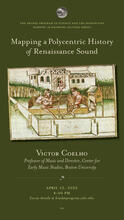The act of creating an inclusive and connective network of all musical practices – sung, played, written, and unwritten – quickly reveals flaws in the hierarchies and priorities that have largely mapped the geography of Early Modern music history. But such charting can also offer the chance for revision, that is, to move across the historically constructed (and still not outdated) boundaries of “central” and “peripheral” styles, “greater” and “lesser” composers, singular and plural modes of performance, notated and improvised practices, and the border between original compositions and their adaptations. In this talk, Professor Victor Coelho of Boston University proposes a more “polycentric” template for understanding music history between ca. 1420-1600, drawing on several case-studies dealing with performance, sound, notation, and transmission as examples of why a history formed of many discrete parts with their individual stylistic constellations may be preferable than attempts at constructing a unified musical universe.
